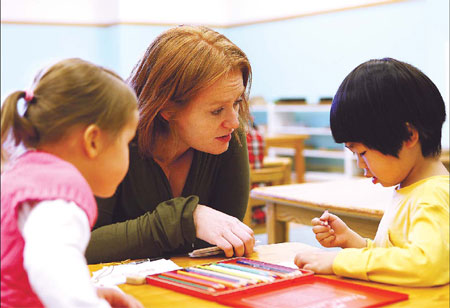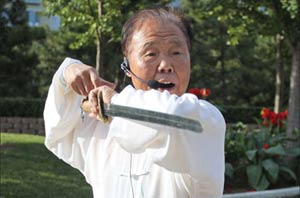Fierce class battle leaves parents deeply frustrated
Updated: 2011-10-14 11:26
By Wu Yiyao (China Daily European Weekly)
|
|||||||||
|
 Kay Findley, a British teacher, shows a Chinese girl how to play a game at the Children's House in downtown Beijing. The kindergarten is one of many that offers bilingual preschool education. [Zhang Tao / China Daily] |
Increasing competition for kindergarten place leads to rising costs
One month after Shanghai kindergartens started the autumn term, Leslie Johnson's 3-year-old son has still not been offered a place in any classroom.
Johnson spent three months calling and visiting more than 20 kindergartens in the city, to no avail.
"I could not even get Richard on the waiting list at most kindergartens I contacted," Johnson, a US citizen, says. "The competition for a place at kindergarten is even fiercer than for college."
Full occupancy is not her only problem. So is the fee.
"I can't understand the costs," says Johnson, a market research project coordinator who is newly settled in Shanghai.
"My budget is $5,000 (3,627 euros) a year, including school bus and lunch, but I realized that it is far from being enough."
As a foreign national, her son cannot attend a publicly funded kindergarten. Private schools are the only choice, but most charge more than she can afford.
"I did consider the cheaper ones, but the catering and security are not satisfactory," she says.
Johnson also was upset when she learned that other parents had given red envelopes - traditional containers for cash gifts - to staff members at kindergartens, seeking enrollment favors.
"In the first place, I am reluctant to get involved in such bribes. I would find it difficult to explain to my boy why I would bribe a teacher or administrator at kindergarten.
"Even if I do some other tricks," she says, "I would be late, because many other parents have done the same, if not better ones, several months ahead of me."
In Shanghai, parents need to start trying to reserve a place at kindergarten one or two years before enrollment. There are too few schools for the number of children.
The Municipal Education Commission said that in 2010, Shanghai had about 400,000 kindergartners, nearly 70 percent of them with hukou, permanent residency permits. To keep pace, the commission said last year it had built more than 400 kindergartens over the previous five years.
Earlier this year, the city announced a new round of expansion, saying 100 more kindergartens would be built within three years. Meanwhile, private kindergartens are encouraged to supplement the public preschools.
Additional data come from a preschool education research team with the Shanghai Municipal People's Congress: At the end of 2010, Shanghai had 1,252 kindergartens, nearly 70 percent of them public. The number of kindergartners will reach 500,000 next year.
China's residence system is still the main barrier to public nurseries and schools for people without hukou. The city's education commission said last year it was considering easing the kindergarten admission policy, but neither conclusion nor timeline has been issued.
There are other factors beyond simple supply and demand that affect Chinese citizens and expatriates. Beijing, for example, has about 1,200 public kindergartens, but about 800 are designated for the children of government, military, university and civil organization employees.
Beijing has 18 international institutes that are approved for kindergarten education. Sixteen of them are allowed to enroll local pupils, cramping the space available for expatriates.
Zhang Lu, father of a 3-year-old girl in Beijing, says the most popular kindergartens in the city are European-style or international kindergartens for children of diplomats and expats. "But many Chinese parents are elbowing to get their kids in," he says.
Parents are struggling to find classrooms for their children.
"We work on a first come, first served system, which is fair," says a clerk at a private kindergarten in Pudong district who gave only her surname, Zhang.
"For kids of foreign nationalities, we have an international class with bilingual teaching that has 30 places," she says. "We suggest that parents come to register a profile of their kids two years in advance, so they will be qualified for enrollment registration."
The monthly fee at Zhang's school is 3,000 yuan (341 euros), an attractive rate. In comparison, one kindergarten with an international class in Qingpu district charges more than 15,700 yuan a month, and one in Pudong charges 10,000.
Wuhan, capital of Central China's Hubei province, also has a popular kindergarten that charges 3,000 yuan a month. And one that charges nearly 17,150. That school boasts that all of its foreign teachers are from London, all furniture comes from Europe, even all the nails used in construction were imported - and the education it provides is worth the money.
Two or three days before registration day, usually in mid-May, parents and grandparents in both cities line up at the lower-cost kindergarten gates to obtain registration forms. Some arrive with tents and food to see them through the wait.
"My granddaughter must enter the kindergarten this year," says Liu Shining, a 55-year-old grandparent in Shanghai's Xuhui district. "We missed the opportunity last year, and she is already one year late."
But early registration does not guarantee a place in the end. Children must undergo an interview in which the private school teachers ask several questions and the youngsters deliver talent shows.
"Basically we look at whether kids are healthy, well-mannered and, hopefully, smart," Zhang says.
Interviews at public kindergartens are even more demanding and complex; some require parents to work together with their kids. Both parents and children are anxious about making good first impressions.
"Listen, you behave yourself, and the teachers will like you, and you will be smart and successful. Otherwise, Mom will be upset, understand?" Qi Luting, 32, told her 4-year-old on his first day in kindergarten in Huangpu district.
The boy, Tang Weilian, managed - barely - not to burst into tears, and he passed two rounds of interviews with excellent performances.
That, Qi says, was a result of her training him for more than six months. "We taught him singing and drawing, and he was one of the several who can play a tune on the piano."
The 7,000-yuan investment for pre-interview training was worthwhile, Qi says. "Education for elites should start right now. If he doesn't do well now, he will be a loser at the starting line."
Expatriates, whose choices are even more limited, must come up with other options.
"What's the point of putting my boy into a kindergarten? To educate him, and let him make friends and have fun," Johnson says.
"But after all these days, I realize that hiring a good nanny may do the same with lower cost and more patience with kids than the young teachers at many kindergartens."
Wang Hongyi contributed to this report.









